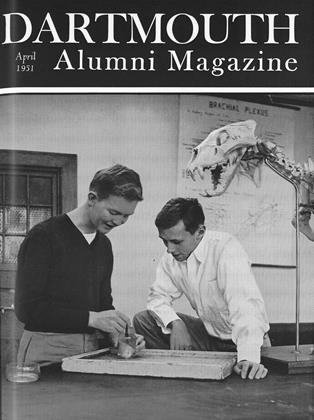JUST for the fun of it, I am writing briefly this month about books read during February, that is from the first to the 24th, when I write this column.
Independent Member by A.P. Herbert (Methuen, London) is a rather amusing autobiography covering the fourteen years Herbert spent in the House of Commons. Nothing he ever wrote is dull, and this book will keep you interested—if you are interested in the British House of Commons and life in Britain in general. Herbert supported several lost causes, and he gives intimate glimpses of Churchill and others.
Courage and Fear by Remy (Barker, London). This is a subject many by now are tired of: the French underground vs. that civilized and gallant ally of ours, Germany. This book may prove an irritant to many who now support our present German policy, and thinking of blood pressures, I don't recommend it too strongly.
Derbyshire, by Crichton Parteus (Hale, London) is a rather charming book of leisurely description about one English county. I discovered that there is a real grave of Little John (Robin Hood's mythical friend) in the village of Hathersage, in the heart of the Robin Hood country. I should like to place a bunch of English daffodils on Little John's grave in memory of Howard Pyle and my childhood.
Menaboni's Birds by Athos and Sara Menaboni. This sumptuous volume came to me through the courtesy of Ranald P. Hobbs '30 and I am most grateful to him. I winced a bit at some of the text as I am a bit allergic to words like "wee," "tummy" etc. However, on the whole the text is charming, and the birds magnificent. Mr. Menaboni, in his perfect realism and in his beautiful handling of color, is a real delight. A magnificent book that I hope you can afford to own.
Nightrunners of Bengal, by John Masters. A lurid, somewhat sexy, historical novel of the Sepoy Rebellion in India. Lavish color, and guaranteed to keep most any reader's interest. I believe this was a Literary Guild selection.
Robert Burns, by David Daiches (Rinehart). This I reviewed at some length in The New York Times, but suffice it to say that for any one who really desires to read Burns this book is invaluable. A penetrating and exhaustive study of almost every poem that Burns ever wrote, written with a light and easy touch.
The Thirty First of February, by Julian Symons. Harper published this novel of how the police, in this instance a Scotland Yard inspector, drive a suspect mad. Far above the average mystery.
Last Changes Last Chances by Henry W. Nevinson. This is the third volume of an autobiography I have re-read again and again. I have always liked Nevinson personally, and his life has been about as interesting as any that I know of. He was a war correspondent for every war from the Boer War on, and that alone kept him busy —I haven't the space to list the wars since 1901, but they came about every other year, and got bigger and better as the century progressed.
The Foot of Pride, by Malcolm Hay. This indictment of Christianity's treatment of the Jews was written by a Roman Catholic and printed by a Protestant Press. A gloomy story, marked by great understanding and sympathy on the part of the author, and with an objective scholarship that is admirable. His point of view is that Germany's horrible crime of genocide was prepared for by centuries of Christian hatred of the Jews as the murderer of Christ. A most revealing book in my opinion. It should make us all a little more humble, and, not without importance, it will give us a far greater knowledge of our religion and its somewhat lugubrious history.
My Six Convicts, by D.P. Wilson. This story of Leavenworth is full of good sense, humor, and an amazing insight into the criminal character. Great fun and enlightening, too.
Happy Odyssey, by Lt. General Sir Adrian Carton de Wiart (London, Cape, 1950). The autobiography of a V.C., a born professional soldier, who positively loved fighting, but who is as free of ideas as a billiard ball.
Richard Hillary, by Lovat Dickson (Macmillan, 1950). An appealing life of that young man who wrote Falling ThroughSpace (The Last Enemy in England) and who did not fail Great Britain in her time of need. After recovering from terrible burns, he flew again, and was killed in a Blenheim in January 1943. A most moving story.
Until You Are Dead, by Henry Kane. About a detective who ought to have his nose punched because his favorite phrase is "Pinch and water." Hard-boiled and readable in an Esquire manner.
Confessions of a China Hand, by Ronald Farquharson. An intelligent picture of China and the Chinese by an old China hand, and early friend of Owen Lattimore.
 View Full Issue
View Full Issue
More From This Issue
-
 Article
ArticleIt All Began in Hanover
April 1951 By FORD H. WHELDEN '25 -
 Article
Article1951 Fund Agents
April 1951 -
 Class Notes
Class Notes1918
April 1951 By ERNEST H. EARLEY, DONALD L. EARR, RICHARD A. HOLTON -
 Class Notes
Class Notes1949
April 1951 By ROBERT H. ZEISER, DAVID S. VOGELS JR., JOHN F. STOCKWELL -
 Class Notes
Class Notes1923
April 1951 By TRUMAN T. METZEL, COLIN C. STEWART 3RD, LEON H. YOUNG JR. -
 Class Notes
Class Notes1911
April 1951 By NATHANIEL G. BURLEIGH, SARGENT F. EATON, MALCOLM G. ROLLINS
HERBERT F. WEST '22
-
 Article
ArticleHanover Browsing
April 1945 By HERBERT F. WEST '22 -
 Books
BooksUNPROMISED LAND
May 1948 By Herbert F. West '22 -
 Books
BooksSEE IF HE WINS
December 1949 By Herbert F. West '22 -
 Article
ArticleHanover Browsing
January 1951 By HERBERT F. WEST '22 -
 Article
ArticleHanover Browsing
June 1951 By HERBERT F. WEST '22 -
 Article
ArticleHanover Browsing
March 1955 By HERBERT F. WEST '22








